 So begins a recent article in the NY Times called “The Rise of Groupthink” by Susan Cain, author of the forthcoming book “Quiet: The Power of Introverts in a World That Can’t Stop Talking.”
So begins a recent article in the NY Times called “The Rise of Groupthink” by Susan Cain, author of the forthcoming book “Quiet: The Power of Introverts in a World That Can’t Stop Talking.”
It is an ideal article for me to read at just the right time: only a few hours away from ending my extended vacation with family and friends and returning to my little workspace in Bristol where I ostensibly toil for hours in solitude over a PhD thesis in Buddhist ethics.
The article, and no doubt the book, praises the solitary thinker, the creativity of the introvert, and the brilliance of silence – all of which seem to work against the stream of contemporary culture, which is loud, fast-paced, and superficial.
Research strongly suggests that people are more creative when they enjoy privacy and freedom from interruption. And the most spectacularly creative people in many fields are often introverted, according to studies by the psychologists Mihaly Csikszentmihalyi and Gregory Feist. They’re extroverted enough to exchange and advance ideas, but see themselves as independent and individualistic. They’re not joiners by nature.
That is definitely me. And that is why I am -somewhat paradoxically to some people- so peacefully happy right now, alone, listening to the soft whir of my computer fan and the refrigerator nearby, sipping Puerh tea, and slowly pulling together a vision of what my next few very busy months might look like. If I can get enough time like this I can pull it all together and make it work (I have conference proposals to write, a paper to be delivered in Oxford in six weeks, a thesis chapter to submit asap, passport pages to add, tickets back to the US and later Thailand maybe again to the US to be figured out, book reviews to write, an online course to plan and teach for a US community college, this blog to keep up, and all the while perhaps maintaining some semblance of contact with human beings). Some people are good at planning and organizing life. I am not. I am good at reading and understanding philosophy, East and West, and finding interesting things to say about them.
I don’t remember where it was now, ahh, yes I do, in an interview with Martin Seligman which I will post in good time – he said that too much time is stressed in our lives in trying to “work on our weaknesses” while we should instead be just focusing on our strengths. Great inventors, scientists, artists, and the like have often been notoriously weak in certain areas of their lives. But that’s not why we appreciate them – we appreciate them because they were so utterly driven by their strengths.
Susan Cain points out the fact that we’ve created a personality cult around Steve Jobs and utterly forgotten a key genius behind all things Apple, the inventor Steve Wozniak:
Before Mr. Wozniak started Apple, he designed calculators at Hewlett-Packard, a job he loved partly because HP made it easy to chat with his colleagues. Every day at 10 a.m. and 2 p.m., management wheeled in doughnuts and coffee, and people could socialize and swap ideas. What distinguished these interactions was how low-key they were. For Mr. Wozniak, collaboration meant the ability to share a doughnut and a brainwave with his laid-back, poorly dressed colleagues — who minded not a whit when he disappeared into his cubicle to get the real work done.
This paragraph spoke very strongly to my own reasons for returning to Bristol this year instead of London. I did my MA in Bristol and had much this sort of environment with my professors and fellow students. Of course it was tea and biscuits (except for myself and Rita, the German professor who taught Sanskrit – coffee for us), but the short, intensive-yet-informal collaborations (aka classes/seminars) fostered the same environment of ideas sort of swirling around to be caught and worked out in a quiet nook in the library or back in my room.
So now I pack for my return to Bristol, with fond memories of seven years ago. I spent half of last year in Bristol, but never quite found the same ‘energy’ as I had back in ’04-’05. Little things like having a cell phone probably contribute much more to that than I know. Having more friends, spread over more continents, to keep up with also surely keeps me from getting as settled as I was during my MA, when I was fresh out of university and a life spent almost entirely in Montana’s wide open spaces.
And that brings me to a point of ethics that probably won’t enter into my academic work too soon, but has been in my thoughts on building my own good life: situation ethics. The sort envisaged by Kwame Anthony Appiah (he writes of them in Experimental Ethics if I remember correctly), in which we take responsibility not only for honing our reasoning abilities or cultivating a good character, but also for the situations we find ourselves in, now and in the future.
That is a thought that I will develop further in another post as well. For now, I return to the beauty of the silence in this moment and the openness which comes out of that silence. And I’ll contemplate bringing solitude back into fashion, at least in my little corner of the world.











